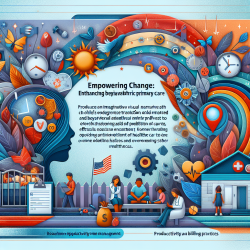Introduction
In the evolving landscape of speech-language pathology, data-driven approaches are paramount in crafting effective therapeutic interventions for children. The research article "Broadening horizons: the case for capturing function and the role of health informatics in its use" offers invaluable insights into the integration of health informatics to enhance patient care. This blog post aims to distill key findings from the research and provide practical steps for practitioners to leverage these insights in their practice.
The Role of Health Informatics
Health informatics is transforming how we capture and utilize data on patient function, particularly in the realms of activity and participation. The World Health Organization’s International Classification of Functioning, Disability, and Health (ICF) serves as a model to understand these interactions. By focusing on activity and participation, practitioners can gain a comprehensive view of a child's functional abilities, beyond mere diagnostic labels.
Key Findings from the Research
The research highlights several challenges and opportunities in capturing and analyzing activity and participation data:
- Inconsistent Documentation: There is a lack of standardized methods for documenting activity and participation across health systems.
- Diverse Data Representation: The variability in data specificity and representation makes it difficult to standardize and utilize information effectively.
- Role of Natural Language Processing (NLP): NLP can automate the extraction and organization of data, reducing the burden on providers and enabling large-scale data analysis.
Practical Steps for Practitioners
To harness the power of health informatics, practitioners can take the following steps:
- Adopt Standardized Documentation Practices: Implement consistent methods for recording activity and participation information during clinical encounters.
- Utilize NLP Tools: Leverage NLP technologies to extract and analyze data from clinical notes, enhancing the understanding of a child's functional status.
- Engage in Continuous Learning: Stay informed about advancements in health informatics and participate in training sessions to improve data literacy.
Conclusion
Integrating health informatics into speech-language pathology practice can significantly enhance therapeutic outcomes for children. By focusing on activity and participation data, practitioners can provide more holistic, patient-centered care. The insights from the research underscore the importance of adopting data-driven approaches and leveraging technological advancements to improve child therapy outcomes.
To read the original research paper, please follow this link: Broadening horizons: the case for capturing function and the role of health informatics in its use.










